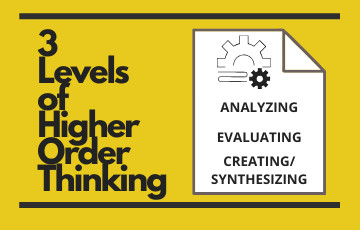
Explore the 3 levels of higher-order thinking and enhance your cognitive abilities. Develop critical thinking, problem-solving, and creativity skills.
1. Analyzing:
“Analysis is the critical starting point of strategic thinking.” – Kenichi Ohmae
The first level of Higher Order thinking is, doing a thorough analysis. You get to analyze the entire problem here.
You do activities like:
- comparing the problem with previous groundworks
- look for any similarities
- compare background knowledge
- Have brainstorming sessions
- Break the problem to understand better
- Hear multiple opinions.
- Organize your findings to get a detailed study of the problem.
2. Evaluating:
“It is only through evaluation that Value Exists.” – Friedrich Nietzsche
Evaluation is the key.
In this ‘Evaluating’ level of higher-order thinking, you:
- Precisely identifying the anomalies
- You remove redundancies
- You remove irrelevant data
- You come up with filtered, credible data
And finally, you pick the essentials for solving the problem.
3. Creating/Synthesizing:
“Creativity is the Production of meaning by synthesis.” – Alex Faickney Osborne
You bring your original ideas, new framework, and fresh designs other than what you have analyzed and evaluated so far.
Words/verbs that correlates Higher Order Thinking Levels:
If you want to understand higher-order thinking, these words/verbs will be the one-word solution for you. You can correlate the words to understand the meaning of higher-order thinking.
Analyzing Level:
Action Verbs/Words are: Appraise, Assess, Check, Compare, Conclude, Criticize, Critique, Defend, Justify, and Support.
Evaluation Level:
Action Verbs/Words are: Choose, Combine, Compose, Construct, Formulate, Hypothesize, Organize, Plan, Produce and Role Play.
Synthesizing Level:
Action Verbs/Words are: Choose, Combine, Compose, Construct, Create, Design, Develop, Formulate, Hypothesize, Invent, Make, Makeup, Originate, Organize, Plan, Produce and Role Play
To summarize Higher Order Thinking:
“We are approaching a new age of synthesis. Knowledge cannot be merely a degree or a skill. It demands a broader vision, capabilities in critical thinking, and logical deduction without which we cannot have constructive progress.” – Li ka Shing


